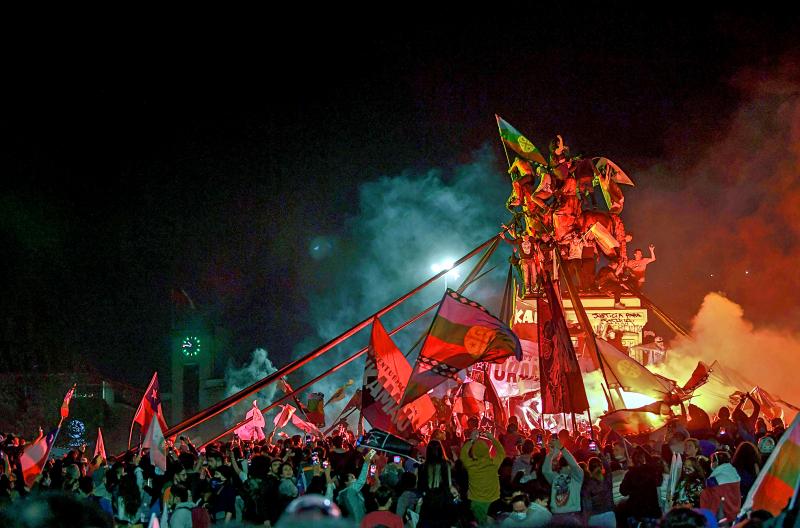Amid a year of contagion and turmoil, Chileans turned out Sunday to vote overwhelmingly in favor of having a constitutional convention draft a new charter to replace guiding principles imposed four decades ago under the military dictatorship of General Augusto Pinochet.
The nation’s conservative government had agreed with the center-left opposition to allow the plebiscite after the outbreak of vast street protests that erupted a year ago in frustration over inequality in pensions, education and healthcare, in what has long been one of South America’s most developed nations.
The Electoral Service on Sunday night said that with nearly all polling stations reporting, about 78 percent of the 7.4 million votes counted favored drawing up a new constitution, while just under 22 percent were opposed.

Photo: AFP
About 79 percent supported having the charter be drafted by a convention of 155 elected citizens rather than a convention with half its members elected citizens and half members of congress.
In a speech to the country, Chilean President Sebastian Pinera acknowledged the victory for those seeking a new charter, but cautioned it is only the start of a long process.
“It is the beginning of a path, which together we will have to go through to agree on a new constitution for Chile,” said Pinera, who had opposed having a new constitution, although he had conceded earlier in the day that it likely would be supported by voters.
The special convention would begin drafting a new constitution that would be submitted to voters in the middle of 2022.
As Pinera spoke, thousands of people celebrated in a central square of the capital used for festivities and protests.
Similar gatherings were held on the outskirts of Santiago.
“What happened in the social outburst is now reflected in the outcome of the plebiscite,” said one celebrant, Paulina Leon.
“I was part of the marches a year ago and I have to take care of my decision and help build a dignified constitution,” she said.
Felipe Caviedes also joined in, saying: “I am part of the social diversity that was marginalized 30 years in this country and now, at last, we can create it ourselves. Now there are real changes coming.”

‘TERRORIST ATTACK’: The convoy of Brigadier General Hamdi Shukri resulted in the ‘martyrdom of five of our armed forces,’ the Presidential Leadership Council said A blast targeting the convoy of a Saudi Arabian-backed armed group killed five in Yemen’s southern city of Aden and injured the commander of the government-allied unit, officials said on Wednesday. “The treacherous terrorist attack targeting the convoy of Brigadier General Hamdi Shukri, commander of the Second Giants Brigade, resulted in the martyrdom of five of our armed forces heroes and the injury of three others,” Yemen’s Saudi Arabia-backed Presidential Leadership Council said in a statement published by Yemeni news agency Saba. A security source told reporters that a car bomb on the side of the road in the Ja’awla area in

PRECARIOUS RELATIONS: Commentators in Saudi Arabia accuse the UAE of growing too bold, backing forces at odds with Saudi interests in various conflicts A Saudi Arabian media campaign targeting the United Arab Emirates (UAE) has deepened the Gulf’s worst row in years, stoking fears of a damaging fall-out in the financial heart of the Middle East. Fiery accusations of rights abuses and betrayal have circulated for weeks in state-run and social media after a brief conflict in Yemen, where Saudi airstrikes quelled an offensive by UAE-backed separatists. The United Arab Emirates is “investing in chaos and supporting secessionists” from Libya to Yemen and the Horn of Africa, Saudi Arabia’s al-Ekhbariya TV charged in a report this week. Such invective has been unheard of

US President Donald Trump on Saturday warned Canada that if it concludes a trade deal with China, he would impose a 100 percent tariff on all goods coming over the border. Relations between the US and its northern neighbor have been rocky since Trump returned to the White House a year ago, with spats over trade and Canadian Prime Minister Mark Carney decrying a “rupture” in the US-led global order. During a visit to Beijing earlier this month, Carney hailed a “new strategic partnership” with China that resulted in a “preliminary, but landmark trade agreement” to reduce tariffs — but

SCAM CLAMPDOWN: About 130 South Korean scam suspects have been sent home since October last year, and 60 more are still waiting for repatriation Dozens of South Koreans allegedly involved in online scams in Cambodia were yesterday returned to South Korea to face investigations in what was the largest group repatriation of Korean criminal suspects from abroad. The 73 South Korean suspects allegedly scammed fellow Koreans out of 48.6 billion won (US$33 million), South Korea said. Upon arrival in South Korea’s Incheon International Airport aboard a chartered plane, the suspects — 65 men and eight women — were sent to police stations. Local TV footage showed the suspects, in handcuffs and wearing masks, being escorted by police officers and boarding buses. They were among about 260 South